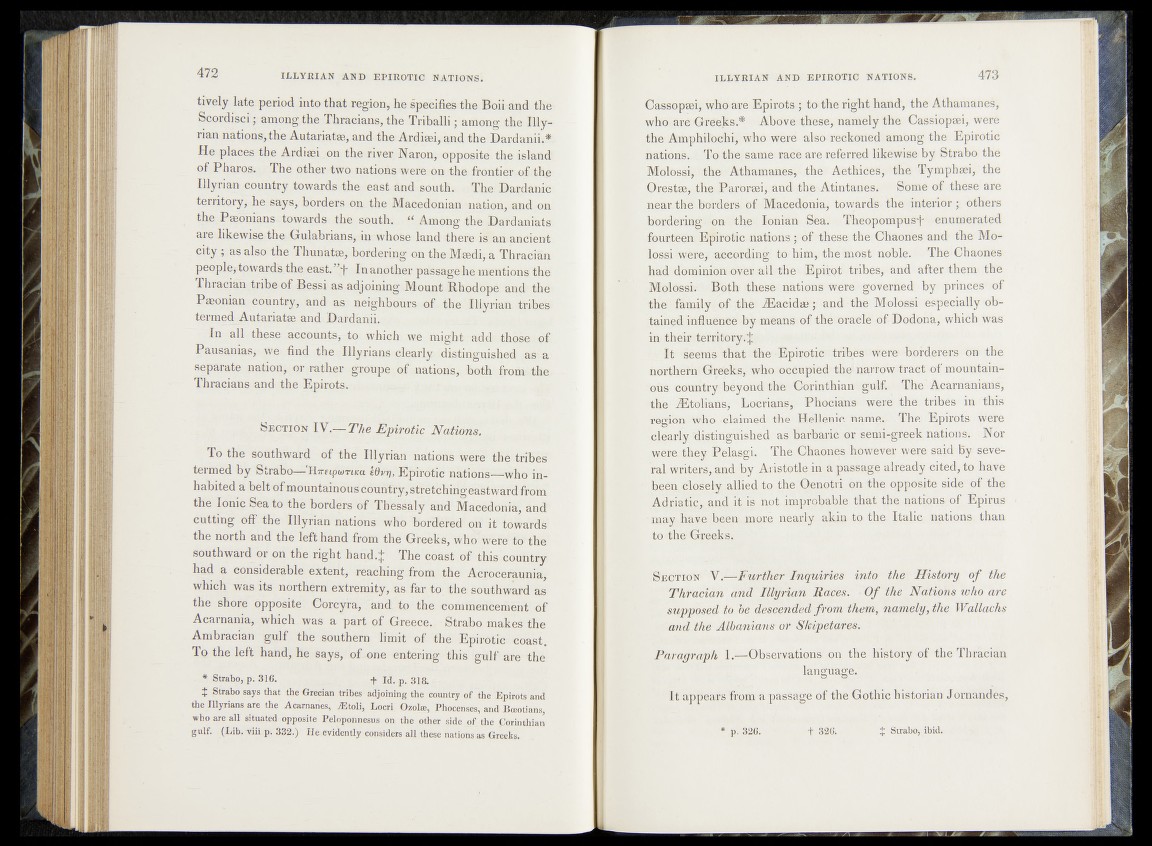
lively late, period into that region, he specifies the Boii and the
Scordisci; among the Thracians, the Triballi ; among the Illyrian
nations,the Autariatse, and the Ardisei, and the Dardanii.*
He places the Ardiaei on the river Naron, opposite the island
of Pharos, The other two nations were on the frontier of the
Illyrian country towards the east and south. The Dardanic
territory, he says, borders oa the Macedonian nation, and on
the Pseonians towards the south. “ Among the Dardaniats
are likewise the Gulabrians, in whose land there is' an ancient
city ; as also the Thun atm, bordering on the Msedi, a Thracian
people, towards the east.”-f In another passage he mentions the
Thracian tribe of Bessi as adjoining Mount Rhodope and the
Paeonian country, and as neighbours of the Illyrian tribes
termed Autariatao and Dardanii.
In all these accounts-, to which we might add those: of
Pausanias, we find the Illyrians clearly distinguished as- a
separate nation, or rather groupe of nations, both from the
Thracians and the Epirots.
S e c t io n I V.— The Epirotic Nations.
To the southward of the Illyrian nations were1 the tribes
termed by Strabo—‘HTrftpwrtjea edvij, Epirotic nations—who inhabited
a belt of mountainous country, stretchingeastward from
the Ionic Sea to the borders of Thessaly and Macedonia, and
cutting off the Illyrian nations who bordered’ on it towards
the north and the left hand from the Greeks, who wefi? to' the
southward or on the right hand + The coast of this country
had a considerable extent, reaching from the Acroceratmia,
which was its northern extremity, as far to_ the southward as
the shore opposite Oorcyra, and to the commencement of
Aearnania, which.was a part oi Greece. Strabo makes the
Ambraeian gulf the southern limit o f the Epirotic coast.
To the left hand, he says, of-one entering this gulf are the
* Strabo, p. 316. f l d , p . 3 ia
$ Strabo says that the Grecian tribes adjoining the country of the Epirots and
the Illyrians are the Acamanes, iEtoli, Locri Ozolse, Phocenses, and Boeotians,
who are all situated opposite Peloponnesus on the other side of the Corinthian
gulf.. (Lib. -riiL p. 332.) He evidently considers all these nations as Greeks.
473
Cassopaei, who are Epirots ; to the right hand, the Athamanes,
who are Greelis.* Above these, namely the Cassiopsei, were
the Amphilbehi, who were also reckoned among the Epirotic
nations., j To tfe; s.ame race are referred likewise by Strabo the
Mólossi, the'. Athamanes, - „the» Aethice’s, the Tymphsei, the
Orestse, the Parbrsei, and. the Atintanes; Some of these are
near thé' borders of Macedonia, towards the interior ; others
bordering'^ on -thep Ionian Sea; Theopompusfe1 enumerated
fourteen Epirotic nations' f ó f 1 these thefelhaones and the Mo-
lossi were, according' to him, the most nr©bïÉ| The Chaones
had dominion ©vev albth§&Epif9tHfibes^ and after-them the
Colossi.' Both these nations were - governed by princes of
the family of/the iEacidm; land -the Moloissi especially obtained
influence by means of the oracle of- Dodona, which was
in their territory^ - :1
It teems fe a t the -Epirotic trib^lwere*feofdp évS^ bn- the
northern* Gre'eks, who occupied feel narrow fcfariftSof mountain-
tons eountry-beyoa’d thevdorinthian^gulf. The Aearnanians,
the JEtbh&osp^Locriaosp Phocians were fee*; tribes in this
-region ;whopplaimed? fee Hellenic name. The Epirots were
clearly 'dMtóguilhed as barbaric or senfegreek nation sp; Nor
were feey'PeksgL. The Chaones however were said by several
w^J^S-Snd by Aristotle ir^|passage already cited, to have
Jbeèn^C^oiely allied to the Oenotri on the opposite the
Adriafep an^’ LO|(h°t improbable that the, nations >o£, Epirus
' may, hay.e been more npafiyw akin to the Italic, nations than
, '.to ‘'the Greeks..
S ection W?—Further Inquiries into the History o f the
Thracian and Illyrian Races. • O f %,e Nations who are
supposed to be descended from them, navnely,the Wallachs
and the Albanians or SMpetares.
Paragraph 1 .—Observations?/,bn the history of thè'Thracian
langdageV; \
It appeals from' a passagé of the Gothic historian Jornandes,
* p . 326. t 326.